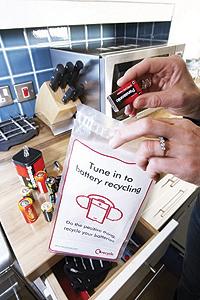With the government consultation on battery recycling coming to a close today (March 13), the Campaign has expressed its concerns with a view to new regulations expected to be finalised by September 2008.
The Campaign for Real Recycling, which is backed by community sector groups and certain reprocessing companies to promote the use of source-separated kerbside recycling systems, is arguing against linking battery recycling collections with existing commingled kerbside collection systems.
It claims that the practice of combining the two collections could lead to batteries not being properly separated, and therefore contaminating other recyclate streams.
It also argues that including batteries in the commingled stream would see batteries becoming part of the non-recyclable reject stream at sorting plants. If this is the case, there is a greater chance of batteries, legally classified as hazardous material, going to landfill or incineration.
Campaign co-ordinator Andy Moore said: “Commingled collection systems are not versatile enough to handle further domestic stream items that require separate or special handling. Source separating streams, by contrast, can handle an almost unlimited variety of materials. Batteries are yet another test of this.”
Doubts
The Campaign's concerns follow doubts expressed last week by the Local Government Association (LGA) over adding batteries to existing kerbside collections at all (see letsrecycle.com story).
Even arguing for source-separated kerbside systems, which it described as the “best option for recovering domestic batteries”, the Campaign for Real Recycling highlighted potential difficulties.
Commenting on kerbside battery trials run by WRAP last year, Mr Moore said: “Where collections were made by kerbside sorted methods into a box, some householders would put the batteries into the box directly when their supply of battery bags was exhausted. This is not ideal, but at least kerbside operatives wearing appropriate gloves had the chance to pick out the batteries at an early stage in the process.”
There is no single answer to collecting batteries, no silver bullet. You've got to do everything.
Michael Green, G&P Batteries
The Campaign co-ordinator criticised separate battery bags being attached to commingled wheeled bins, also tried by WRAP, warning that if householders included batteries in with the commingled material when their separate bags run out, there would be no opportunity for collection operatives to pick them out.
“In our view this is a major system flaw, as this would make it highly unlikely that the operative would identify or recover the batteries before they are tipped into the compacter collection vehicle,” he said. “The batteries will be squashed and further concealed in other materials or even broken open, compounding the contamination problems facing the MRF operations.”
Variety
Michael Green, whose collection and processing company G&P Batteries is working with WRAP to test possible collection systems, told letsrecycle.com yesterday that a variety of options would be needed for batteries.
He said: “There is no single answer to collecting batteries, no silver bullet. You've got to do everything; kerbside, CA sites, offices, schools, retailers – they're all needed to meet the targets.”
Referring specifically to the use of kerbside collections, he stated that “where kerbside is suitable, it should definitely be used”, adding that the most important consideration should be that “there needs to be a collection point wherever people want to dispose of used batteries”.
Last November, G&P launched its Battbox scheme, seeking to address issues relating to the collection of portable batteries from businesses (see letsrecycle.com story).
Commenting on its success, Mr Green said: “It's going okay; it was always going to be a fairly small initiative. There have been problems though; people don't see why they should have to pay.”
However, he was keen to emphasise the importance of collections from businesses if European battery recycling targets are to be met. “It is a natural assumption to think that if you take batteries out of households then you're there, but there is a big hole that needs to be filled and that comes from the workplace,” he said.
Under the Battery Directive, which is set to come into force on the UK by September 26, 25% of the UK's waste portable batteries must be collected by 2012.
-
Batteries are to be discussed in detail at this year's Recycling and Waste Forum 2008, to be held on April 16-17 in Birmingham.












Subscribe for free